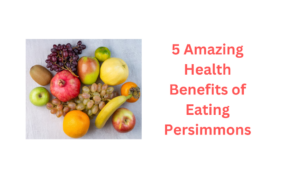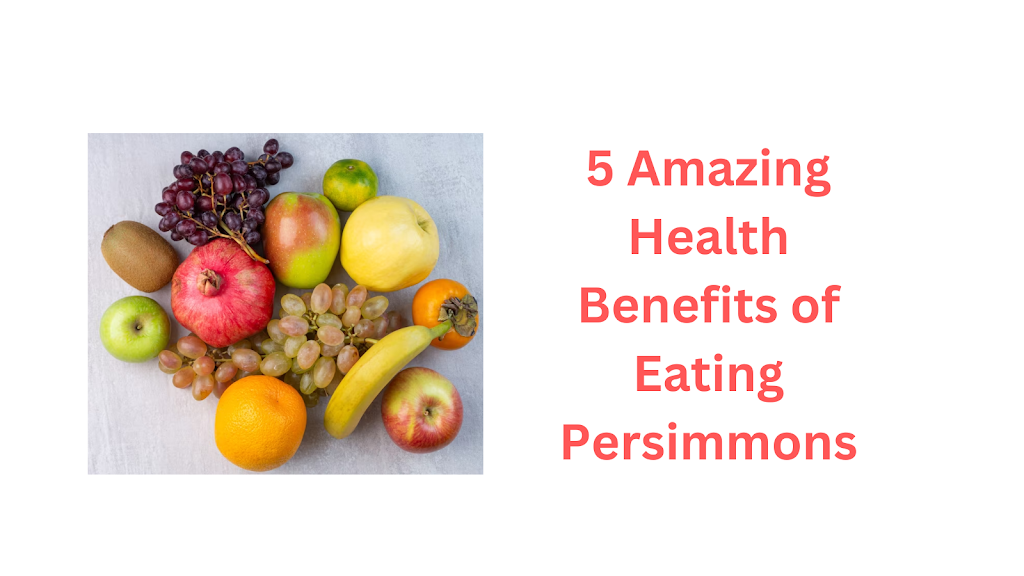5 Amazing Health Benefits of Eating Persimmons
You may not have heard of them, but persimmons are a delicious fruit that offer some amazing health benefits. Here are five of the best reasons to start eating persimmons today:
-
They’re loaded with antioxidants.
-
They can help improve your digestion.
-
They’re anti-inflammatory.
-
They’re a great source of fiber.
-
They’re low in calories and carbs.
What Are Persimmons and Where Can You Buy Them?
Persimmons are a type of fruit that is native to Asia and is related to the fig. It has a Fuyu or acorn shape and is light orange in color with a smooth skin. It is sweet and has a gelatinous texture. Persimmons are available from October to February.
You can buy persimmons at most grocery stores.
Nutritional Content of Persimmons
There are a ton of nutrients in persimmons that make them a health powerhouse.
For starters, they’re packed with fiber, which is essential for maintaining a healthy digestive system. Fiber also helps keep you feeling full after eating, which can help with weight loss or weight management.
Persimmons are also a good source of vitamin C, which is important for boosting your immune system and helping your body repair itself. They’re also rich in antioxidants, which can help protect your body from free radicals and the damage they can cause.
How to Use Persimmons in Meals
Now that you know all about the amazing health benefits of eating persimmons, it’s time to learn how to use them in your meals. Persimmons are a versatile fruit that can be used in both savory and sweet dishes.
 |
| 5 Amazing Health Benefits of Eating Persimmons |
For savory dishes, persimmons can be sliced and added to salads for a tart and juicy addition. They also pair well with meats like pork and chicken. You can also use them as a topping for pizza or flatbreads.
For sweet dishes, persimmons are perfect for desserts. They can be pureed and added to smoothies or yogurt, or used in baking recipes like muffins, cakes and breads. They can also be eaten fresh as a snack or added to bowls of oatmeal or cereal.
Health Benefits of Consuming Persimmons
In case you didn’t know, persimmons are incredibly nutrient-dense fruits that have a unique and sweet taste. They contain an impressive array of vitamins and minerals which can benefit your health in a number of ways. Here are some of the amazing health benefits that you can get from eating persimmons.
First, they are high in fiber, which can help to regulate digestion and keep your colon healthy. Additionally, they are rich in antioxidants such as vitamin C, which can help reduce inflammation and protect your cells from damage. They are also an excellent source of vitamin A, which is necessary for vision health and proper skin cell development. Finally, persimmons contain essential minerals like potassium, magnesium and calcium which help to support strong bones and teeth.
Eating these fruits regularly can help you get their numerous benefits while also enjoying their unique flavor. So start incorporating persimmons into your diet today!
Potential Risks From Eating Persimmons
When considering adding something new to your diet, it’s important to weigh the pros and cons. While persimmons offer many health benefits, there are a few potential risks associated with eating them as well.
First, it’s important to note that persimmons contain oxalates, which can block absorption of the body’s minerals, like calcium and iron. So if you’re concerned about your intake of these minerals, it might be best to consume persimmons in moderation. Additionally, individuals with kidney problems should avoid eating large amounts of persimmon as oxalates can lead to the development of kidney stones.
Finally, unripe persimmons contain tannins which can cause an upset stomach when eaten in large quantities. Be sure to wait until the fruit is completely ripe before consuming.
All in all, eaten in moderation and ripe-ready for consumption – persimmon is a great choice for those looking for a nutritious snack!
How to Store Persimmons for Maximum Freshness
Storing persimmons properly is also important to maximize their health benefits. To store persimmons, place them in a loosely closed paper bag and store them in the refrigerator until they are ripe. If you are not able to consume them right away, freezing the persimmons is an option as well. If you plan on freezing them, make sure to remove the skin and freeze in an airtight container.
When ready to enjoy, simply thaw frozen persimmons by placing them in the refrigerator overnight. Ripe persimmons can be stored at room temperature for up to 3 days, giving you plenty of time to enjoy their deliciousness!
To tell when a persimmon is ripe and ready to eat, gently squeeze it: it should be slightly soft but not mushy. You can also tell by its color—ripe persimmons should have a bright orange hue.
Conclusion
Persimmons are a great source of fiber, vitamin C, and vitamin A, all of which play a role in promoting good health. Eating persimmons can help keep your digestive system functioning properly, boost your immune system, and protect your eyesight.
